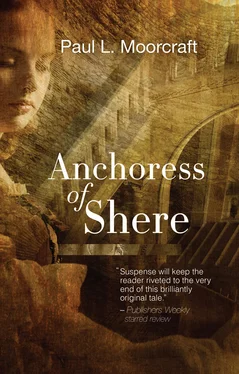Paul Moorcraft - The Anchoress of Shere
Здесь есть возможность читать онлайн «Paul Moorcraft - The Anchoress of Shere» весь текст электронной книги совершенно бесплатно (целиком полную версию без сокращений). В некоторых случаях можно слушать аудио, скачать через торрент в формате fb2 и присутствует краткое содержание. Жанр: Триллер, на английском языке. Описание произведения, (предисловие) а так же отзывы посетителей доступны на портале библиотеки ЛибКат.
- Название:The Anchoress of Shere
- Автор:
- Жанр:
- Год:неизвестен
- ISBN:нет данных
- Рейтинг книги:4 / 5. Голосов: 1
-
Избранное:Добавить в избранное
- Отзывы:
-
Ваша оценка:
- 80
- 1
- 2
- 3
- 4
- 5
The Anchoress of Shere: краткое содержание, описание и аннотация
Предлагаем к чтению аннотацию, описание, краткое содержание или предисловие (зависит от того, что написал сам автор книги «The Anchoress of Shere»). Если вы не нашли необходимую информацию о книге — напишите в комментариях, мы постараемся отыскать её.
The Anchoress of Shere — читать онлайн бесплатно полную книгу (весь текст) целиком
Ниже представлен текст книги, разбитый по страницам. Система сохранения места последней прочитанной страницы, позволяет с удобством читать онлайн бесплатно книгу «The Anchoress of Shere», без необходимости каждый раз заново искать на чём Вы остановились. Поставьте закладку, и сможете в любой момент перейти на страницу, на которой закончили чтение.
Интервал:
Закладка:
Christine asked, “Is it not possible to learn from the Holy Ghost, and to confirm, in dedication, prayer and good works, a knowledge which the layman might know and yet the priest does not-what the fishermen of Galilee did know and the doctor of theology in Oxford today might not? Is it not possible that lovers of eternity can be taught by the doctor within? I have been taught that St. Francis mistrusted learning as a source of pride; is that not so, Father?”
“Is that not your own pride speaking, Christine?” he replied rather hastily.
Christine pressed her tutor on the central Christian principle of free will. She understood that man could choose between good and evil. God allowed evil, so that mankind could be tested, the priest explained. But was there really free will, if so much was predetermined, so many prophecies to fulfil, she asked. “What if Joshua had chosen to ignore the trumpets at the walls of Jericho?” she asked again. “Or if Abraham and Isaac had raised holy arguments against human sacrifice? Could the Holy Mother have refused to go to Bethlehem?”
Father Peter struggled to refute her logic. Sometimes, though, he laughed at her innocent humour. Once he explained that man was a little lower than the angels. Immediately she said, “Then the angels should reform themselves, and quickly too.”
At other times he realised that Christine was deliberately teasing him. When they were discussing abstinence, she asked, “Why did God believe the only humans worthy of salvation in the Flood were a family of winemakers?”
Yet the priest was shaken, nonetheless, by her rapid advances in both vocabulary and perception. They confirmed the power of her vision, perhaps, but he knew that if such changes were discussed in the parish she could be accused of witchcraft, and so might he. Occasionally she claimed to hear voices, and once or twice he reprimanded her, gently to be sure, for referring to herself in the third person. Sometimes he was not sure whether her fervour bordered on madness, but her calmness of spirit sometimes calmed his, too. Frequently he fretted about her, realising that much of what she said to him was arguably heretical. He thus encouraged her enclosure in a place where he could protect her from herself and, more importantly, from her Church.
“Remember how often do shrews find themselves on the ungodly end of the ducking stools,” he warned. “Remember how Mistress Le Walshe from Gomshall was taken by the bailiff and her tongue cut from her mouth for speaking out against the Church. She was fortunate. Think on them who have burned in the pit for saying that the Holy Scriptures should be put into our vulgar speech, not Latin.”
Christine always listened attentively to the priest’s strictures, but knew without doubt that she was embarked on a righteous path.
For nearly two years Christine prepared for her seclusion, assisted by the advice and prayers of Father Peter. As before, she continued to help in the fields and around her father’s house, but she laughed no more with other maidens, nor did she dance with the young men on feast days. Every day she attended church to learn scripture, at first by rote. Slowly she learned her letters in English, and even more slowly began to read a little Latin. Father Peter was not himself a scholar and had to work diligently to school himself for his lessons with Christine.
Her education was augmented by occasional retreats at a Dominican friary at Guldenford. It had been founded by Eleanor of Provence, widow of Henry III, in memory of her young grandson, who had died in the royal castle by the bridge across the golden sands which gave the town its name. Because there were no self-governing nunneries in any of the Hundreds of Surrey, Queen Eleanor had requested that the friary offer guidance to pious women, and so a small convent was established nearby. Father Peter was acquainted with the Abbess Euphemia and introduced Christine to her. It did not take long for the abbess to recognise the piety and intelligence of the humble village girl and Christine was offered a place in the convent, where the sisters soon came to accept that her vocation was that of a solitary.
Christine learned dutifully the offices and devotions of the Church and Father Peter explained in detail the long and careful sequence of prayers. He rehearsed her nearly every day in the timetable of the devotions she would have to perform when she entered her cell: “When you rise at dawn, make the sign of the Cross, saying the Paternoster, then begin at once the Veni Creator Spiritus, kneeling at your bench and bowing forward. Stay thus throughout this hymn and for the versicle ‘Send Forth Thy Spirit.’ Next, repeat the Paternoster and a Credo while you are dressing…”
And so her daily programme of devotions was planned, interspersed by observation of the Mass and occasionally the sacrament of communion.
Father Peter explained to Christine how lenient and at the same time how strict an anchoress’s observations could be. Certain high-born women had built elaborate shelters, almost tiny houses, adjoining their churches. They might have one or two maid-servants and could entertain visitors. Some even kept pet cats, he said. Others gossiped with their friends through a grille which faced the street.
Christine, however, resolutely chose one of the most austere rules that Christendom had concocted: no meat or fat unless gravely ill; no visitation through her grille except on strictly spiritual matters, although she was permitted to speak to family members on mundane issues of daily sustenance; but no other contact except for food, water, change of vestment or participation in communion. The priest would shave her head four times a year. But she foreswore the hedgehog skins, spiked belts and thorn adornments to wear next to her flesh or sleep on, as some zealots chose. She refused to scourge herself with nettles or whips to drive away temptation. God, she knew, was love, not pain. She had known pain enough; it was His love she sought.
Christine chose to clothe herself in a simple cap with a white veil instead of a wimple, and a plain dress of coarse flax. Her family would provide her food and clothes, and some church alms would be granted to sustain her. A small cell was built on St. James’s dank north wall where the sun never shone, and William helped with such woodwork as was necessary. The squint and quatrefoil were placed in the wall, with a few stones left aside for the enclosure ceremony.
It would be some decades before Guldenford would be designated as a suffragan or subsidiary bishopric, and therefore the dean did not have sufficient authority to approve the enclosure. So the Bishop of Winchester’s final approval was sought, and granted: “On the fourteenth day of the Kalends of August in the year of our Lord 1329, and in the seventh year of our consecration…I have sought fit to grant licence to the said Christine that she may be enclosed in the church at Shere in the manner of an Anchoress, so that, aside from public and worldly sights, she may be enabled to serve God more freely in every way, and, having resisted all opportunity for wantonness, may keep her heart undefiled by this world.”
He attached his bishop’s seal. And the next day, the day after her eighteenth birthday, Christine was sealed within the northern wall for life.
The words did not flow with ease, and Duval struggled with the muse for weeks. His writing was sometimes becoming a task to hate, not a pleasurable outlet for his passions, as in the past.
Duval’s congregation in Guildford was becoming more disenchanted, complaining that he was cold and distracted even when he finally stirred himself to visit a sick or troubled member of his flock, and his penances imposed during confession raised more than a few hackles. They had become onerous, almost bizarre. The bishop summoned him twice to counsel him: “a self-improvement programme” was the bishop’s precise phrase. Bishop Templeton had recently been an enthusiastic participant in a church administration course in New York, and so he talked sociology, not theology; management, not morality. The prelate was a passionate advocate of modernising to preserve the best of the old traditions. Duval suspected that the bishop’s real love was not God but sport; that he worshipped at the altar of the Marylebone Cricket Club. And Duval despised him for it, even though he could accept Lord Mancroft’s famous argument that the English, not being a spiritual people, had invented the game to give themselves at least some conception of eternity.
Читать дальшеИнтервал:
Закладка:
Похожие книги на «The Anchoress of Shere»
Представляем Вашему вниманию похожие книги на «The Anchoress of Shere» списком для выбора. Мы отобрали схожую по названию и смыслу литературу в надежде предоставить читателям больше вариантов отыскать новые, интересные, ещё непрочитанные произведения.
Обсуждение, отзывы о книге «The Anchoress of Shere» и просто собственные мнения читателей. Оставьте ваши комментарии, напишите, что Вы думаете о произведении, его смысле или главных героях. Укажите что конкретно понравилось, а что нет, и почему Вы так считаете.












